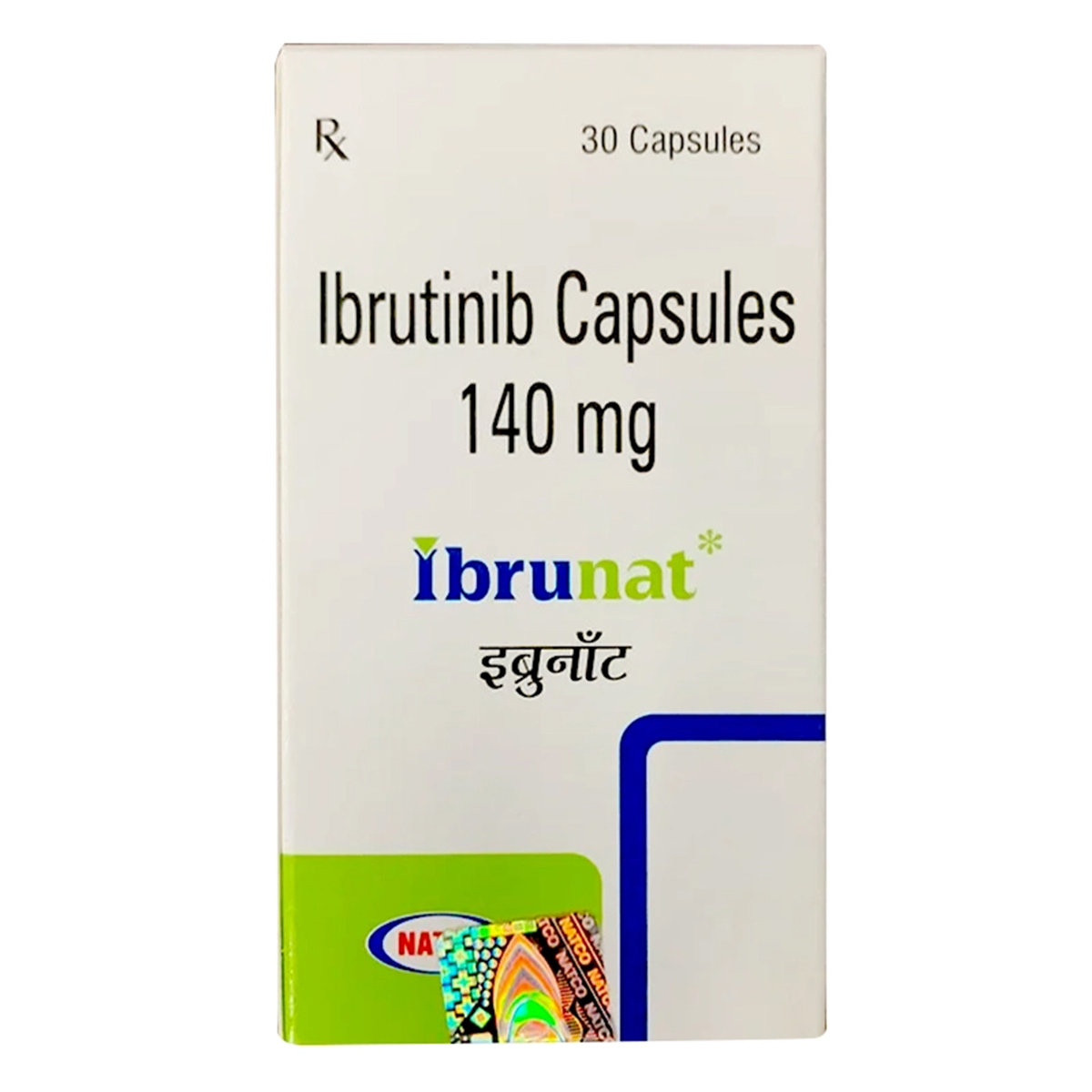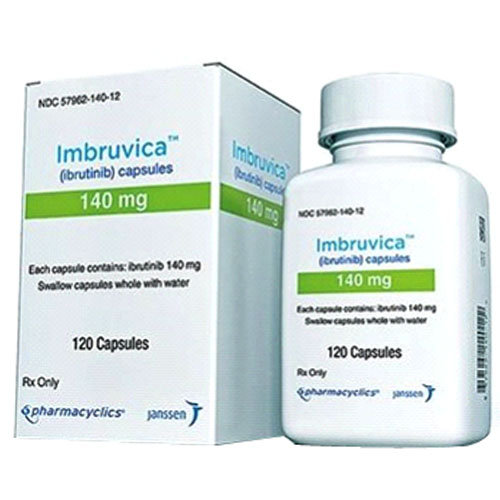Ibrutinib
About Ibrutinib
Ibrutinib belongs to the group of anti-cancer medicines called protein kinase inhibitors used to treat the following blood cancers in adults- mantle cell lymphoma (cancer affecting the lymph nodes), chronic lymphocytic leukaemia (cancer affecting white blood cells and lymph nodes), and waldenström's macroglobulinaemia (cancer affecting white blood cells).
Ibrutinib contains Ibrutinib, which works by blocking Bruton's tyrosine kinase, a protein in the body that helps cancer cells grow and survive. Thereby, it kills and reduces the number of cancer cells. It also slows down the worsening of cancer.
In some cases, Ibrutinib may cause side effects such as nausea, vomiting, diarrhoea, constipation, indigestion, and fatigue. Most of these side effects may not require medical attention and resolve gradually over time. Do not be reluctant to talk with your doctor if any of the side effects persist or worsen.
Do not take Ibrutinib if you are pregnant or breastfeeding. Consult the doctor immediately if you become pregnant during treatment with Ibrutinib. This medicine is not recommended for children as safety and effectiveness have not been established. Inform the doctor about your health condition and medications to rule out any side effects/interactions.
Uses of Ibrutinib
Medicinal Benefits
Ibrutinib belongs to the group of anti-cancer medicines called protein kinase inhibitors used to treat the following blood cancers in adults- mantle cell lymphoma, chronic lymphocytic leukaemia, and waldenström's macroglobulinaemia. This medicine may also be used to treat marginal zone lymphoma (cancer that begins in a type of white blood cells that normally fights infection) and chronic graft vs host disease (a complication of hematopoietic stem-cell transplant). Ibrutinib contains Ibrutinib, which works by blocking Bruton's tyrosine kinase (a protein in the body that helps cancer cells grow and survive). Thereby, it kills and reduces the number of cancer cells. It also slows down the worsening of cancer.
Directions for Use
Storage
Side Effects of Ibrutinib
- Nausea
- Vomiting
- Diarrhoea
- Constipation
- Headache
- Fatigue
- Dizziness
- Mouth sores
Drug Warnings
Do not take Ibrutinib if you are allergic to any of its components, if you are taking St. John's wort (herbal medicine) or if you are pregnant/breastfeeding. Inform the doctor if you have/had unusual bruising or bleeding, irregular heartbeat, heart failure, hepatitis B infection, liver problems, high blood pressure, kidney problems, or if you are due to undergo any surgery. Seek immediate medical attention if you experience symptoms of progressive multifocal leukoencephalopathy, a serious brain infection (trouble thinking, memory loss, sight loss, or difficulty walking), stroke (sudden confusion, numbness or weakness, trouble speaking, sight loss, loss of balance, or sudden severe headache), heart failure (breathlessness, difficulty breathing when lying down, weakness/tiredness, or swelling of the feet, ankles, or legs), rupture of the spleen (left abdominal pain, pain below the left rib cage or at the tip of left shoulder), infection (chills, fever, weakness, body aches, cold, flu symptoms, or confusion), or haemophagocytic lymphohistiocytosis, an inflammatory disorder (fever, bruising, swollen glands, or skin rash).
Drug Interactions
Drug-Drug Interactions: Inform the doctor if you are taking CYP3A inhibitors or inducers.
Drug-Food Interactions: Avoid taking grapefruit or Seville oranges (bitter oranges) or their juice, as they might increase the amount of ibrutinib in your blood.
Drug-Disease Interactions: Inform the doctor if you have an irregular heartbeat, heart failure, hepatitis B infection, liver problems, high blood pressure, or kidney problems.
Drug-Drug Interactions Checker List:
Safety Advice

Alcohol
consult your doctorIt is not known if alcohol affects Ibrutinib. However, avoid consumption of alcohol while on treatment with Ibrutinib as it may worsen your condition.

Pregnancy
unsafeIbrutinib belongs to pregnancy category D. Ibrutinib should not be used during pregnancy. Use effective contraception and avoid pregnancy during treatment with Ibrutinib.

Breast Feeding
unsafeAvoid breastfeeding while taking Ibrutinib.

Driving
cautionIbrutinib may cause dizziness and tiredness. Do not drive or operate machinery if you experience any side effects that might lessen your ability to do so.

Liver
cautionAvoid taking Ibrutinib if you have moderate or severe baseline liver impairment. Dose adjustment may be needed in patients with mild liver impairment. If you have a history of liver disease, inform the doctor.

Kidney
consult your doctorIf you have a history of kidney disease, inform your doctor before taking Ibrutinib.

Children
unsafeIbrutinib is not recommended for children as safety and effectiveness have not been established.
Habit Forming
Diet & Lifestyle Advise
- Eat a healthy diet and exercise regularly to maintain proper weight.
- Avoid smoking and alcohol consumption.
- Include vegetables and fruits in your diet.
- Avoid fast food, fried food, processed meats, refined carbs and added sugar.
- Get optimal sleep; rest well.
- Drink enough water.
Special Advise
- Women of childbearing potential should use highly effective contraception during treatment and for three months after receiving the last dose.
- If you are due to undergo any surgery, including dental surgery, inform the doctor/dentist that you are on treatment with Ibrutinib.
- Your doctor may recommend tests to check liver function.
- Drink plenty of water or other fluids while taking Ibrutinib.
Patients Concern
Disease/Condition Glossary
Mantle cell lymphoma (MCL): Mantle cell lymphoma is a type of cancer that affects the lymph nodes. Symptoms include swelling of lymph nodes, fever, night sweats, weight loss, fatigue, nausea, vomiting, pain, bloating, and indigestion.
Chronic lymphocytic leukaemia (CLL): Chronic lymphocytic leukaemia is a type of cancer affecting white blood cells called lymphocytes that also involves the lymph nodes. Symptoms include swollen lymph nodes, easy bruising, and fatigue.
Waldenström's macroglobulinaemia (WM): Waldenström's macroglobulinaemia is a type of cancer that affects white blood cells called lymphocytes. Symptoms include anaemia (lack of red blood cells), frequent infections due to lack of white blood cells, swelling of lymph nodes, pain and discomfort.
FAQs
Ibrutinib works by blocking the action of an abnormal protein that helps cancer cells multiply. Thereby, it stops the spread of cancer cells.
Ibrutinib may make you bleed more easily. Therefore, consult the doctor if you are taking blood thinner medicines (heparin, warfarin), NSAIDs (aspirin, ibuprofen, naproxen), or supplements that may increase the risk of bleeding (flaxseed, vitamin E, fish oil).
Ibrutinib may affect the heart, especially if you already have heart diseases like heart failure, heart rhythm problems, diabetes, high blood pressure, or are of advanced age. Consult the doctor instantly if you experience symptoms of heart failure like breathlessness, difficulty breathing when lying down, weakness/tiredness, or swelling of the feet, ankles, or legs.






